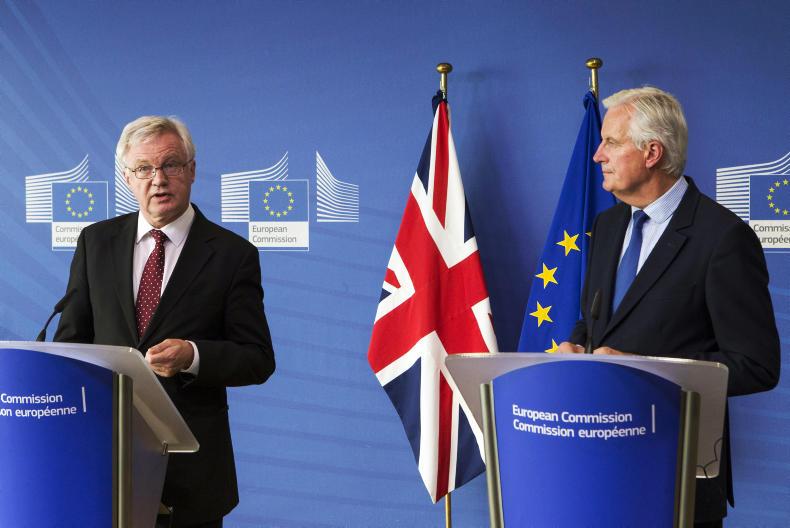The latest round of Brexit negotiations have concluded without enough progress for moving to the next stage. EU chief negotiator Michel Barnier told a press briefing in Brussels this afternoon that he will not be able to recommend progressing to the next stage of negotiations at next week's heads of state Council.
The core issues that the EU required for progressing to the next stage were resolution of the UK's financial committments on leaving, the Irish border and the rights of citizens.
The issues
This issue of EU citizen’s rights in the UK and vice versa has also proved a problem, with the issue revolving around which courts would adjudicate on disputes. The EU wants the EU Courts and the UK wants future residency issues to be covered by UK courts.
Listen to the views of Colin Smith of Northern Ireland's Livestock and Meat Commission on the latest Brexit developments:
The third big ticket item in the EU priority list is the Irish border.
Both the UK and EU have repeatedly said how they want this to continue as it has been, yet the Irish border will be the EU border with the UK in the future.
Without both jurisdictions being part of the same customs union or some arrangement that creates the same effect, it is difficult to visualise how it can be anything other than a full international border.
The leaked report by the Revenue Commissioners last weekend gave a clear indication of just how expensive and intrusive that would be.
UK politics
Negotiations are not helped by the internal wrangling that is ongoing in the UK Conservative party. The latest issue is the level of investment that the Government should be making in preparing for Brexit without agreement with the EU.
Chancellor Philip Hammond, who is not enthusiastic about Brexit, isn’t planning to make budget provision for this until he is more certain that there will be no deal. The Prime Minister appeared to contradict this, saying that “where money needs to be spent it will be spent” in reply to questions in the House of Commons.
What has become increasingly clear that there is a realisation growing in the UK that a deal may not happen.
Quotas
One area where progress has been made is in dealing with import quotas after Brexit. The EU and UK have now formally written to World Trade Organization outlining a path for the distribution, though the details of plans were so well leaked in advance that a number of countries including Brazil, the US and New Zealand have already objected.
Listen to the views of Peter Hardwick, head of exports at AHDB, on the latest Brexit developments:
Read more
The simple part of Brexit gets complicated
Full coverage: Brexit
The latest round of Brexit negotiations have concluded without enough progress for moving to the next stage. EU chief negotiator Michel Barnier told a press briefing in Brussels this afternoon that he will not be able to recommend progressing to the next stage of negotiations at next week's heads of state Council.
The core issues that the EU required for progressing to the next stage were resolution of the UK's financial committments on leaving, the Irish border and the rights of citizens.
The issues
This issue of EU citizen’s rights in the UK and vice versa has also proved a problem, with the issue revolving around which courts would adjudicate on disputes. The EU wants the EU Courts and the UK wants future residency issues to be covered by UK courts.
Listen to the views of Colin Smith of Northern Ireland's Livestock and Meat Commission on the latest Brexit developments:
The third big ticket item in the EU priority list is the Irish border.
Both the UK and EU have repeatedly said how they want this to continue as it has been, yet the Irish border will be the EU border with the UK in the future.
Without both jurisdictions being part of the same customs union or some arrangement that creates the same effect, it is difficult to visualise how it can be anything other than a full international border.
The leaked report by the Revenue Commissioners last weekend gave a clear indication of just how expensive and intrusive that would be.
UK politics
Negotiations are not helped by the internal wrangling that is ongoing in the UK Conservative party. The latest issue is the level of investment that the Government should be making in preparing for Brexit without agreement with the EU.
Chancellor Philip Hammond, who is not enthusiastic about Brexit, isn’t planning to make budget provision for this until he is more certain that there will be no deal. The Prime Minister appeared to contradict this, saying that “where money needs to be spent it will be spent” in reply to questions in the House of Commons.
What has become increasingly clear that there is a realisation growing in the UK that a deal may not happen.
Quotas
One area where progress has been made is in dealing with import quotas after Brexit. The EU and UK have now formally written to World Trade Organization outlining a path for the distribution, though the details of plans were so well leaked in advance that a number of countries including Brazil, the US and New Zealand have already objected.
Listen to the views of Peter Hardwick, head of exports at AHDB, on the latest Brexit developments:
Read more
The simple part of Brexit gets complicated
Full coverage: Brexit






 This is a subscriber-only article
This is a subscriber-only article










SHARING OPTIONS: